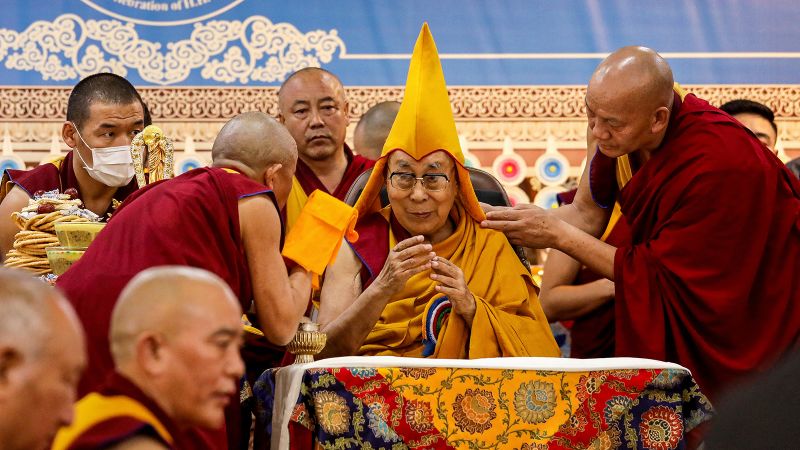
The Dalai Lama has announced that his spiritual leadership will continue beyond his lifetime, affirming the succession of a new Dalai Lama after his death. This declaration, made on Wednesday via a video message to religious elders in Dharamsala, India, reinforces a centuries-old tradition that stands at the heart of a contentious struggle with China’s Communist Party over the future of Tibet.
“I am affirming that the institution of the Dalai Lama will continue,” stated the Dalai Lama in his pre-recorded message, emphasizing the importance of maintaining this spiritual lineage. He cited numerous requests from Tibetans and Tibetan Buddhists urging him to ensure the continuation of this role. “The Gaden Phodrang Trust has sole authority to recognize the future reincarnation; no one else has any such authority to interfere in this matter,” he added, referring to the formal office of the Dalai Lama.
The Historical Context of Tibetan Leadership
The Dalai Lama’s announcement comes at a critical juncture, as he approaches his 90th birthday. Since fleeing Tibet following the failed uprising against Chinese rule in 1959, he has lived in exile in India. His leadership has been a symbol of Tibetan resistance and cultural preservation amid China’s ongoing efforts to assert control over Tibet.
Historically, the selection of a new Dalai Lama involves intricate religious rituals and consultations with high lamas of Tibetan Buddhism. The current Dalai Lama has previously indicated that he would re-evaluate the necessity of the institution when he reaches 90, consulting with religious leaders and the Tibetan public.
China’s Stance and the Potential for Conflict
This recent announcement sets the stage for a potential clash between Tibetan leaders in exile and the Chinese government. The Chinese Communist Party, which is officially atheist, claims the authority to approve the next Dalai Lama. This claim is part of a broader strategy to exert influence over Tibetan Buddhism and integrate Tibet more closely with China.
In his memoir published in March, the Dalai Lama asserted that his successor would be born in the “free world” outside of China, urging his followers to reject any candidate selected by Beijing. This situation could lead to the unprecedented emergence of two rival Dalai Lamas: one chosen by the traditional Tibetan process and another appointed by the Chinese authorities.
“The Gaden Phodrang Trust has sole authority to recognize the future reincarnation; no one else has any such authority to interfere in this matter.” — The Dalai Lama
Expert Opinions and Future Implications
Experts on Tibetan affairs suggest that the Dalai Lama’s decision is a strategic move to preserve Tibetan culture and autonomy in the face of Chinese political pressure. According to Dr. Lobsang Sangay, former President of the Tibetan Government-in-Exile, “This announcement is a reaffirmation of the Tibetan people’s right to self-determination and religious freedom.”
The potential for two competing Dalai Lamas raises questions about the future of Tibetan Buddhism and its followers. A division could lead to significant geopolitical tensions, not only affecting Tibet but also impacting international relations with countries that support the Tibetan cause.
Looking Ahead: The Path to Succession
As the Dalai Lama approaches his 90th birthday, the world watches closely to see how this succession will unfold. The process will likely involve consultations with high lamas and the broader Tibetan community, adhering to traditional practices while navigating the complexities of modern geopolitics.
The Dalai Lama’s declaration underscores the resilience of Tibetan culture and the ongoing struggle for autonomy. As the spiritual leader continues to advocate for peace and dialogue, his legacy and the future of Tibetan Buddhism remain pivotal issues on the global stage.




